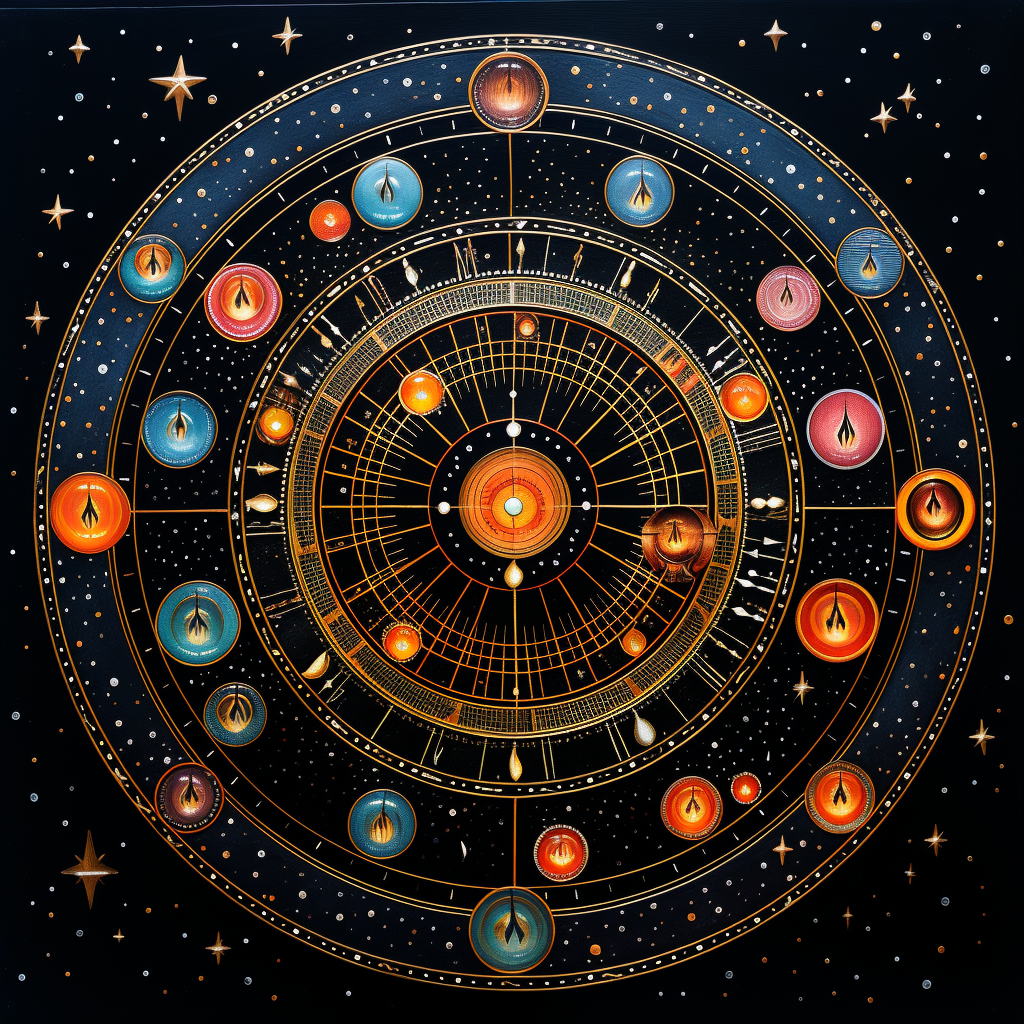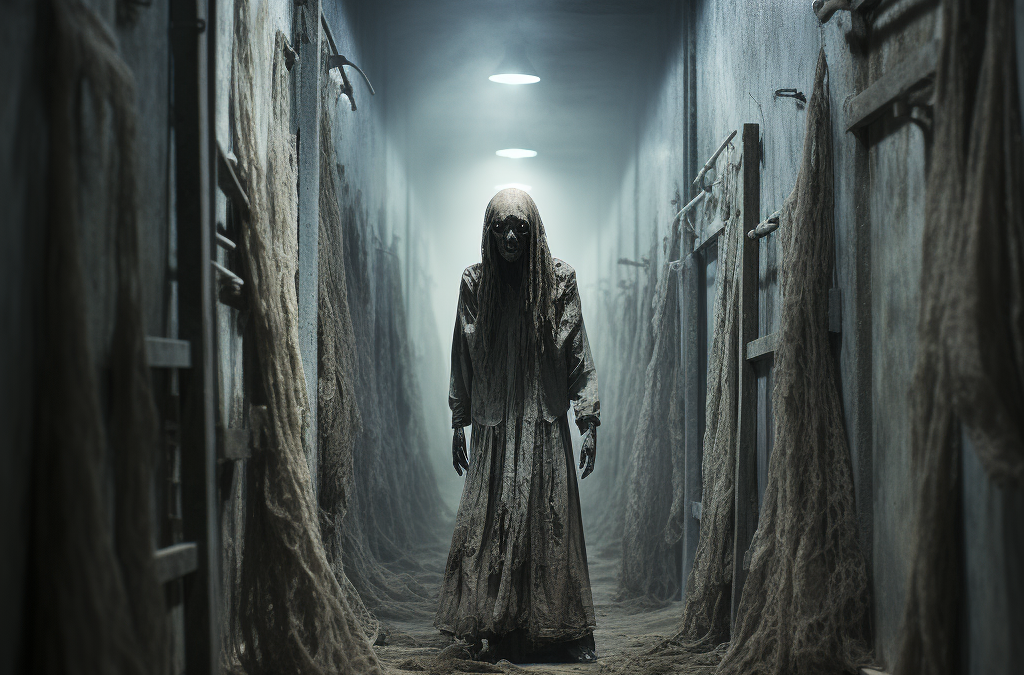Do you enjoy the thrill of fear? Are you a fan of supernatural stories, eerie experiences, and spine-chilling tales? If your answer is yes, then this article is for you! We have put together a list of some of the most terrifying paranormal games that are guaranteed to leave you with sleepless nights. These games, steeped in dark legends and urban myths, involve rituals to summon spirits, entities, and otherworldly beings. So, buckle up for a journey into the realm of the unknown and get ready to experience the true meaning of fear.
- 1. The Midnight Game
The Midnight game is an ancient pagan ritual that allegedly dates back to the times of witch trials. It involves summoning the Midnight Man, an entity that will torment the player throughout the night. To play, you will need a candle, a piece of paper, a pen, matches or a lighter, salt, a wooden door, and a drop of your own blood. Write your full name on the paper and add a drop of blood. Then, place the paper in front of the door, light the candle, and knock on the door 22 times, making sure the last knock occurs exactly at midnight. Open the door, blow out the candle, close the door, and immediately relight the candle. Now, the Midnight Man is in your home.
The objective is to avoid the Midnight Man until 3:33 a.m. by moving around the house with the candle. If the candle goes out, it means the Midnight Man is near, and you must surround yourself with a circle of salt for protection. Failing to do so or not following the rules can result in horrifying consequences.
- 2. The Three Kings
The Three Kings game is a ritual that enables the player to access “The Shadowside,” a mysterious realm where it is believed that one can communicate with ethereal beings and supernatural forces. The game requires a large, quiet room, two mirrors, three chairs, a fan, a bucket of water, a mug, and an object with personal significance. The ritual begins at 11 p.m., when the player sets up the chairs, mirrors, and fan in a specific arrangement and leaves the room until 3:30 a.m.
Upon returning, the player must sit in the central “throne” chair, holding the personal object, and stare into the darkness. It is said that the player will then start to perceive strange, unsettling sights and sounds, as well as receive messages from the entities on the other side.
- 3. The Closet Game
The Closet game is a simple yet terrifying game that involves summoning a demonic presence inside your closet. To play, you need a match and a pitch-dark closet. Enter the closet, close the door, and stand in the darkness. Then, whisper the phrase, “Show me the light or leave me in darkness.” Listen for any whispers or movement. If you hear anything, immediately light the match and leave the closet.
Be warned; if you fail to light the match in time or look at the demon, it is said that you will be dragged into eternal darkness.
- 4. One Man Hide and Seek
This chilling game originates from Japan and involves playing hide-and-seek with a possessed doll. To play, you will need a stuffed doll, rice, a needle and thread, a sharp object, a cup of saltwater, and a bathroom with a bathtub. Remove the doll’s stuffing and replace it with rice, then sew it up with the needle and thread. Next, fill the bathtub with water and place the doll inside. Turn off all the lights in your home and begin the game by telling the doll that you are “it.”
Hide in a room with the cup of saltwater, and after a while, return to the bathroom to find the doll. Stab the doll with the sharp object, and then run back to your hiding spot. It is believed that the doll will come to life and seek revenge, so be prepared for a terrifying night of supernatural hide-and-seek.
These paranormal games offer a terrifying experience for those who dare to play. Remember, though, that these games come with serious risks and potential dangers. It is crucial to approach them with caution and respect for the unknown. After all, tampering with the supernatural is not a game.
Secrets of the Zodiac: A Comprehensive Guide to the 12 Astrological Houses

Astrology is a fascinating and complex subject that has captivated people’s attention for centuries. The zodiac, or the circle of twelve 30° divisions of celestial longitude, is the basis of this ancient art. At the heart of astrology lies the concept of the astrological houses, which represent the different areas of life. Each house corresponds to a specific zodiac sign, and together they form the foundation for understanding how the celestial bodies influence our lives.
If you’ve ever been curious about astrology and the meanings behind the twelve houses, this comprehensive guide will help you unlock the secrets of the zodiac and gain a deeper understanding of yourself and the world around you.
- 1. The First House: Aries – The House of Self
Ruled by the planet Mars, the first house represents our sense of self and identity. It governs our physical appearance, first impressions, and the way we project ourselves to the world. A strong first house can indicate a confident and assertive individual, while a weaker first house may suggest a more introverted and passive personality.
- 2. The Second House: Taurus – The House of Possessions
The second house is associated with the earth sign Taurus and is ruled by Venus. This house represents our material possessions and financial security. It governs our attitudes towards money, personal values, and our sense of self-worth. A well-placed second house can indicate financial success and stability, while a challenged second house may suggest financial struggles and a lack of material comfort.
- 3. The Third House: Gemini – The House of Communication
Ruled by Mercury, the third house is linked to the air sign Gemini. This house governs our communication skills, including the way we think, speak, and write. It also represents our relationships with siblings, neighbors, and our immediate environment. A strong third house can indicate someone who is articulate, intellectually curious, and enjoys learning, while a weaker third house may suggest difficulty in expressing oneself or a lack of mental stimulation.
- 4. The Fourth House: Cancer – The House of Home and Family
The fourth house is associated with the water sign Cancer and is ruled by the Moon. This house governs our home life, family, and roots. It represents our emotional foundations, as well as our sense of security and stability. A well-placed fourth house can indicate a strong connection to family and a nurturing nature, while a challenged fourth house may suggest a difficult home life or a lack of emotional support.
- 5. The Fifth House: Leo – The House of Creativity and Romance
Ruled by the Sun, the fifth house is linked to the fire sign Leo. This house represents our creative expression, including artistic pursuits, hobbies, and romantic relationships. It also governs our ability to take risks and enjoy life. A strong fifth house can indicate a passionate, fun-loving individual with a flair for the dramatic, while a weaker fifth house may suggest a lack of confidence or difficulty expressing oneself creatively.

- 6. The Sixth House: Virgo – The House of Health and Service
The sixth house is associated with the earth sign Virgo and is ruled by Mercury. This house governs our daily routines, work, and health. It represents our ability to be of service to others and maintain our physical and mental well-being. A well-placed sixth house can indicate a responsible, organized individual with a strong work ethic, while a challenged sixth house may suggest health issues or difficulty maintaining a balanced lifestyle.
- 7. The Seventh House: Libra – The House of Partnerships
Ruled by Venus, the seventh house is linked to the air sign Libra. This house represents our relationships and partnerships, including marriage and business partnerships. It governs our ability to form and maintain meaningful connections with others. A strong seventh house can indicate a diplomatic, fair-minded individual who values harmony and balance, while a weaker seventh house may suggest difficulty in maintaining long-term relationships or a tendency towards codependency.
- 8. The Eighth House: Scorpio – The House of Transformation
The eighth house is associated with the water sign Scorpio and is ruled by Pluto. This house governs our experiences of transformation, including birth, death, and rebirth. It represents our ability to overcome challenges and grow from our experiences. A well-placed eighth house can indicate a resilient, resourceful individual with a deep understanding of life‘s mysteries, while a challenged eighth house may suggest a fear of change or difficulty facing life‘s challenges.
- 9. The Ninth House: Sagittarius – The House of Philosophy and Travel
Ruled by Jupiter, the ninth house is linked to the fire sign Sagittarius. This house represents our quest for knowledge, wisdom, and spiritual growth. It governs our experiences of travel, higher education, and our beliefs about the world. A strong ninth house can indicate an adventurous, open-minded individual with a love for learning, while a weaker ninth house may suggest a narrow worldview or a lack of intellectual curiosity.
- 10. The Tenth House: Capricorn – The House of Career and Public Reputation
The tenth house is associated with the earth sign Capricorn and is ruled by Saturn. This house governs our career, public reputation, and achievements. It represents our ambitions, goals, and aspirations. A well-placed tenth house can indicate a successful, driven individual who is respected in their field, while a challenged tenth house may suggest a lack of direction or difficulty achieving success.
- 11. The Eleventh House: Aquarius – The House of Friendship and community
Ruled by Uranus, the eleventh house is linked to the air sign Aquarius. This house represents our friendships, social networks, and involvement in groups and communities. It governs our ability to work with others towards a common goal. A strong eleventh house can indicate an innovative, humanitarian individual who values social connections, while a weaker eleventh house may suggest a difficulty forming bonds with others or a lack of involvement in social causes.
- 12. The Twelfth House: Pisces – The House of the Unconscious and Spiritual Growth
The twelfth house is associated with the water sign Pisces and is ruled by Neptune. This house represents our unconscious mind, dreams, and intuition. It governs our spiritual growth, as well as our connection to the collective unconscious. A well-placed twelfth house can indicate a compassionate, empathetic individual with a deep understanding of the human experience, while a challenged twelfth house may suggest a fear of the unknown or difficulty accessing one’s intuition.
The twelve astrological houses offer a rich and complex framework for understanding ourselves and the world around us. By exploring the meanings and influences of each house, we can gain valuable insights into our strengths, weaknesses, and the forces that shape our lives. With this comprehensive guide, you can unlock the secrets of the zodiac and embark on a journey of self-discovery and personal growth.
The Ancient Beginnings of Astrology

Astrology, the study of celestial bodies’ influence on human affairs and the natural world, has fascinated humanity for millennia. From ancient civilizations to modern-day horoscopes, people have sought to understand the secrets of the stars and use this knowledge to navigate their lives. But where did this captivating practice begin, and how did it evolve over time? This article will delve into the roots of astrology, shedding light on its ancient beginnings and the journey it undertook to become the widely known practice it is today.
The Dawn of Astrology
The precise origins of astrology are difficult to pinpoint, as the practice likely developed independently in various regions across the world. However, some of the earliest known astrological records date back to the Mesopotamian civilization around 2000 BCE. The Sumerians, the first people of Mesopotamia, observed the movements of celestial bodies and began to associate these patterns with earthly events and human behavior.
The Babylonians, who succeeded the Sumerians, further developed these astrological ideas. They were the first to create the zodiac – a circle of twelve constellations along the ecliptic, the apparent path of the Sun across the celestial sphere. Each constellation was associated with specific qualities and characteristics, which formed the basis of horoscopic astrology.
The Egyptian Influence
Astrology also flourished in ancient Egypt, where it became an essential part of their culture and religion. The Egyptians were skilled astronomers, and they used their knowledge to develop a sophisticated calendar system. They believed that the stars had a direct influence on the course of human life, and they sought to understand this celestial guidance to improve their daily lives and ensure a favorable afterlife.
The Greek Connection
The Hellenistic period (323–30 BCE) marked a significant turning point for astrology. The conquests of Alexander the Great resulted in a fusion of Greek, Mesopotamian, and Egyptian knowledge, which led to the birth of horoscopic astrology as we know it today.
Greek astronomers and astrologers, such as Ptolemy and Hipparchus, made significant contributions to the field. Ptolemy’s work, the Tetrabiblos, became a foundational text for Western astrology, outlining the basic principles and techniques still used today.
The Romans adopted Hellenistic astrology and integrated it into their culture and religion. The zodiac signs and their associated characteristics became widely known and used by the Roman population to determine their fortunes and make decisions in their daily lives.
Astrology in the East
Astrology also has deep roots in the Eastern world, particularly in India and China. Vedic astrology, or Jyotish, is an ancient Indian practice that dates back to at least 1500 BCE. This form of astrology is based on the sacred Hindu texts known as the Vedas, which provide guidance on understanding the celestial influences on human life.
Chinese astrology, which dates back to the Zhou dynasty (1046–256 BCE), is another distinct form of astrology that has evolved independently of Western practices. The Chinese zodiac is based on a 12-year cycle, with each year associated with a specific animal sign. Chinese astrology places great emphasis on understanding the balance of Yin and Yang energies and the Five Elements (wood, fire, earth, metal, and water) to predict and improve one’s life path.
The Middle Ages and Astrology
During the Middle Ages, astrology gained widespread popularity across Europe, with many scholars and philosophers engaging in the study of celestial influences. Astrology played a significant role in medieval medicine, as physicians believed that the alignment of the stars and planets could affect bodily health and disease.
The Renaissance and the Decline of Astrology
The advent of the Renaissance in Europe saw a renewed interest in astrology, with many prominent artists, writers, and thinkers delving into the secrets of the stars. However, the rise of the scientific revolution in the 17th century led to a decline in astrology’s prominence. The development of modern astronomy and the scientific method challenged the validity of astrological predictions and gradually pushed the practice to the fringes of society.
Conclusion

From ancient Mesopotamia to modern-day horoscopes, astrology has been an integral part of human history, culture, and belief systems. As our understanding of the cosmos continues to evolve, it remains to be seen how astrology will adapt and persist in the future. What is undeniable, however, is that the quest to unlock the secrets of the stars and understand our place in the cosmos is a fundamental aspect of the human experience.
Join Our Discord HERE for Free Art and NFT Game Items
🌐 https://discord.gg/4KeKwkqeeF
🚤 https://opensea.io/EyeOfUnity
🎭 https://rarible.com/eyeofunity
🍎 https://magiceden.io/u/eyeofunity
Other Websites by Eye of Unity:
https://eyeofunity.com
https://meteyeverse.com
https://000arcade.com
https://00arcade.com
https://0arcade.com
https://wealth-financing.com
https://techgenstore.com
https://systementcorp.com
https://affiliatesbonus.com
https://albertbrain.com
https://lastdaystore.com
https://controlsecret.com
https://realufopics.com
https://officialmikemc.com
https://keyselfdefense.com
https://ashleymega.com

